India and the European Union (EU) share a long-standing and multifaceted relationship, characterized by cooperation in various domains such as trade, politics, security, development, science, technology, and people-to-people ties. As two large democracies with a shared commitment to multilateralism, democracy, and economic prosperity, their relations have evolved significantly over the years, with increasing convergence on global issues and challenges. India-EU relations, however, also face challenges stemming from different priorities and perspectives in areas such as trade, climate change, and security.
1. Historical Context of India-EU Relations
India and the EU’s engagement dates back to the 1990s when the EU began recognizing India as a key strategic partner. The India-EU Partnership and Cooperation Agreement (PCA), signed in 1994, was the first major agreement between the two, laying the foundation for cooperation in economic, political, and developmental areas. Over the years, India has become one of the EU’s key partners in Asia, with both sides working together to enhance bilateral ties and address regional and global issues.
In recent years, especially after the 2000s, there has been a marked shift towards a more comprehensive strategic partnership. In 2004, the India-EU Strategic Partnership was formally established, setting the stage for increased cooperation in sectors such as trade, security, environment, and science and technology. This partnership was further reinforced through the 2016 EU-India Agenda for Action and a joint declaration in 2018 that emphasized the commitment to enhancing the bilateral relationship across various dimensions.
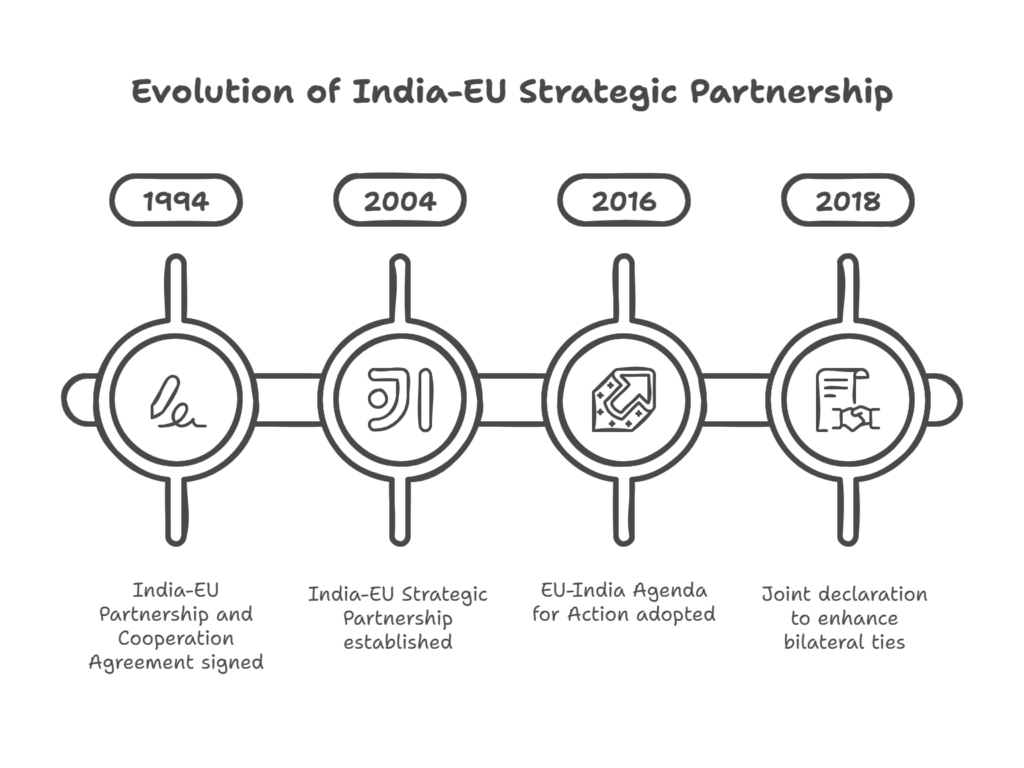
2. Economic and Trade Relations
Economic and trade relations form the cornerstone of India-EU ties. The EU is India’s largest trading partner, and India is one of the EU’s largest export destinations in Asia. The bilateral trade in goods and services has grown significantly over the years, but the relationship has been hampered by certain trade barriers, including issues of market access, tariffs, and non-tariff barriers.
- Trade Volume: In 2020, the EU-India trade volume stood at approximately €90 billion (around $100 billion), making the EU India’s largest trading partner. The trade primarily consists of machinery, chemicals, and pharmaceuticals from the EU, and textiles, engineering products, and information technology services from India.
- EU-India Free Trade Agreement (FTA): The issue of an EU-India Free Trade Agreement (FTA) has been a significant point of discussion. Negotiations for an FTA have been ongoing since 2007 but have faced multiple hurdles due to differences over issues like intellectual property rights, market access, tariffs, and labor mobility. Although progress has been slow, both sides have shown renewed interest in advancing these talks, particularly with India’s increasing economic importance and the EU’s interest in diversifying its economic partnerships beyond China.
- Investment and Financial Cooperation: In addition to trade, investment relations between India and the EU are also critical. The EU is one of the largest foreign investors in India, particularly in the automobile, energy, telecommunications, and information technology sectors. Likewise, India has also been an attractive market for European companies, especially in areas such as infrastructure development and technology.
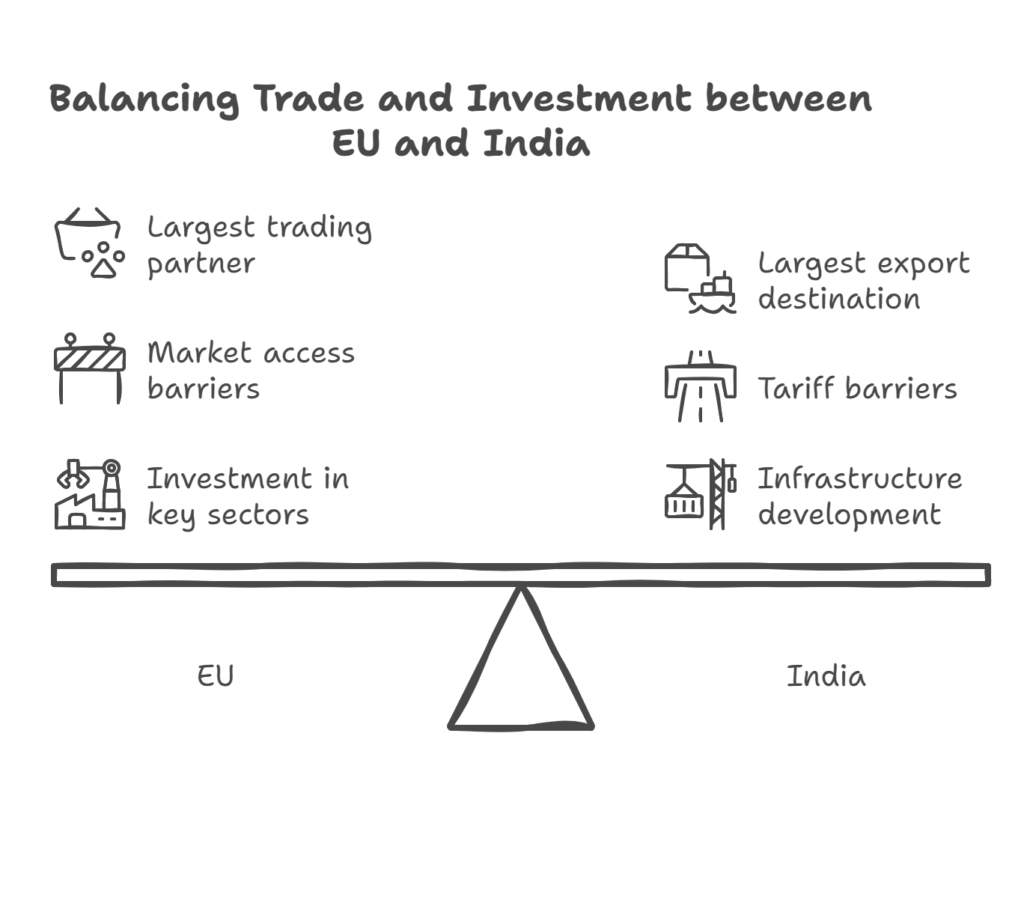
3. Political and Strategic Cooperation
India and the EU are both strong proponents of multilateralism and have shared interests in upholding a rules-based international order. Their political and strategic cooperation focuses on global challenges such as climate change, counter-terrorism, peace and security, and global governance.
- Climate Change and Sustainability: India and the EU have been working together to tackle global environmental challenges, especially climate change. The EU has been a key partner in supporting India’s climate action through financial assistance, technology transfer, and capacity building. The EU-India Clean Energy and Climate Partnership aims to promote clean energy solutions and climate resilience. Both sides have pledged to work towards the Paris Agreement goals and have committed to enhancing cooperation on renewable energy technologies, energy efficiency, and sustainable urbanization.
- Counter-Terrorism Cooperation: Counter-terrorism is another area where India and the EU share common concerns. Both sides face the threat of terrorism and extremism, with cross-border terrorism being a significant issue for India, especially in its relationship with Pakistan. The EU has expressed solidarity with India in addressing the threat of terrorism, and both sides have worked together in multilateral forums such as the United Nations to push for a global framework to combat terrorism and address related issues like money laundering and cybersecurity.
- Global Governance: India and the EU share common values when it comes to global governance. They support the reform of international institutions like the United Nations Security Council (UNSC), with India seeking a permanent seat. Both sides advocate for an inclusive and multipolar world order, where emerging economies like India play a larger role in decision-making processes on issues such as trade, peace, and security.
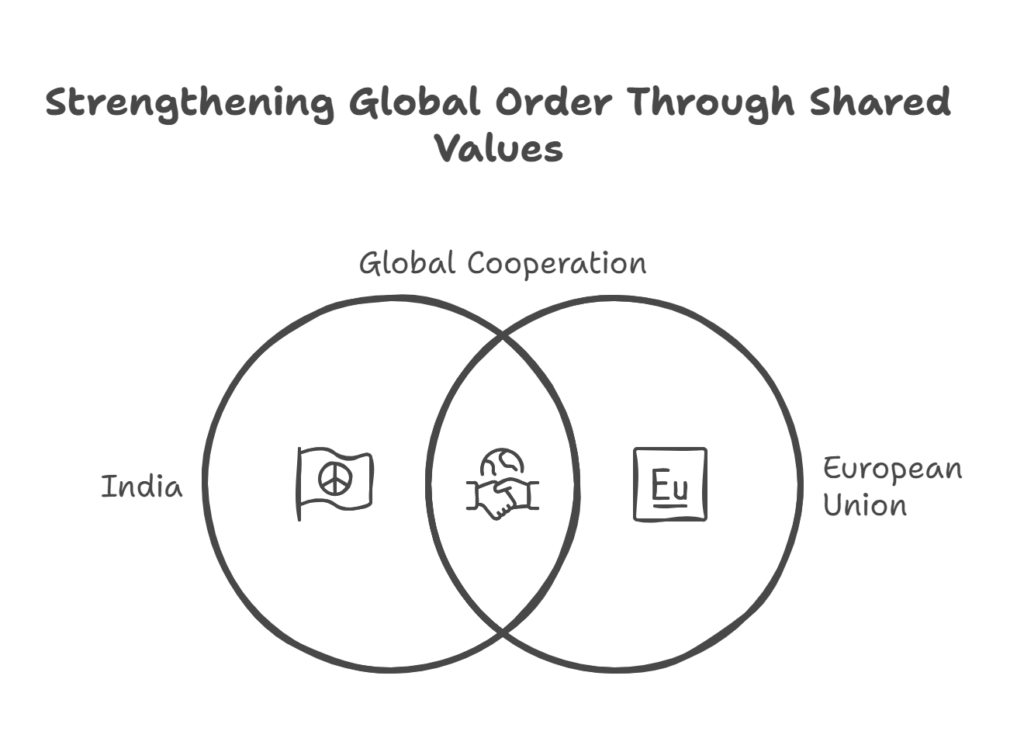
4. Science, Technology, and Innovation Cooperation
In addition to economic and political ties, science, technology, and innovation form an important part of the India-EU relationship. The EU has been instrumental in supporting India’s space research, information technology, and healthcare sectors, while India’s advancements in information technology and space exploration are of growing interest to European researchers and institutions.
- Horizon Europe: One of the key frameworks for cooperation in research and innovation is Horizon Europe, the EU’s largest research and innovation program. India has participated in several collaborative projects under this program, particularly in areas like nanotechnology, biotechnology, clean energy, and healthcare.
- Joint Research Initiatives: India and the EU have collaborated on a number of joint research initiatives, such as the EU-India Science and Technology Cooperation Agreement, which facilitates cooperation in various fields, including space exploration, climate change, and healthcare innovation.
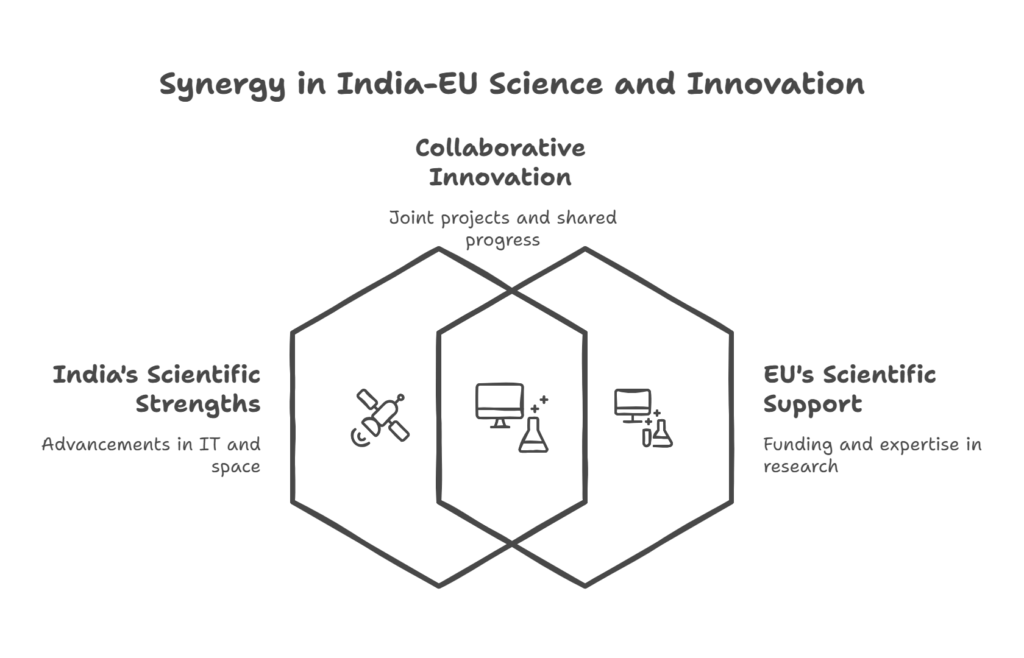
5. People-to-People Ties
People-to-people relations between India and the EU are also strong, with millions of Indians living across European countries, and a growing number of European students and professionals choosing India as a destination for education and business. The cultural exchange between India and the EU is enhanced through tourism, cultural programs, and academic partnerships.
- Educational Cooperation: Academic exchanges between India and the EU have flourished, with numerous students, researchers, and professionals moving between the two regions. India’s higher education sector, particularly in fields like engineering, IT, and business, attracts students from EU countries, while Indian students benefit from Erasmus+ scholarships and study programs in Europe.
- Tourism and Cultural Diplomacy: Tourism and cultural diplomacy are also key components of people-to-people ties. The EU has been an important source of tourists visiting India, and reciprocal cultural exchanges help in strengthening mutual understanding.
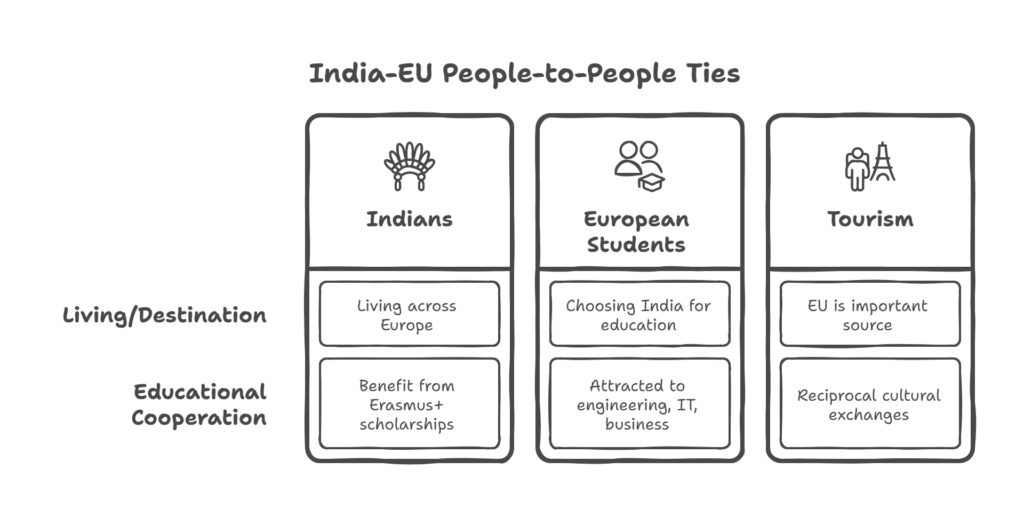
6. Challenges and Areas of Tension
While India-EU relations are largely positive, there are several areas of tension that impact the overall dynamics:
- Trade and Market Access: As mentioned earlier, the slow progress on the EU-India Free Trade Agreement remains a significant challenge. Both sides have competing interests in areas like agriculture, intellectual property, and trade in services, which hinder deeper economic integration.
- Human Rights and Governance Issues: The EU has occasionally raised concerns over issues related to human rights, freedom of expression, and democratic governance in India, particularly with regard to the Kashmir conflict, citizenship laws, and minority rights. These concerns sometimes create friction in the bilateral relationship.
- Security and Strategic Interests: While both India and the EU share common interests in global peace and stability, they sometimes differ on specific security issues, such as the approach to Pakistan or China. India’s emphasis on strategic autonomy sometimes conflicts with the EU’s preference for a more collective approach to foreign policy.
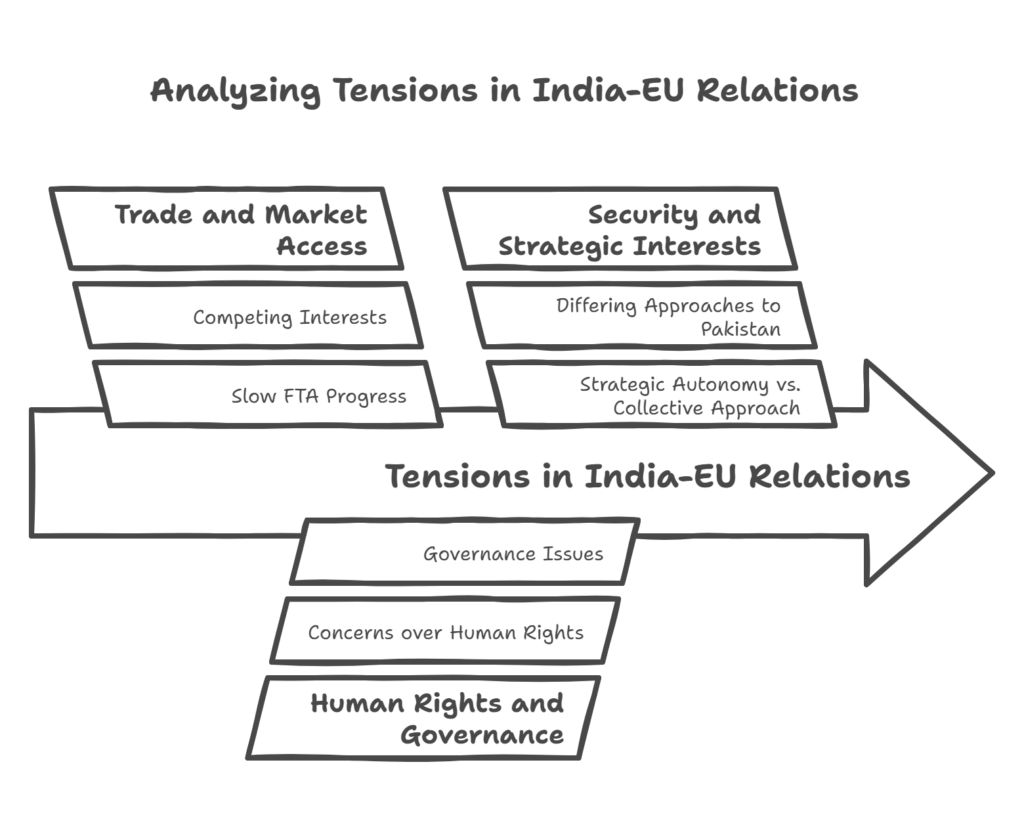
Conclusion
In conclusion, India and the European Union have built a robust and multifaceted relationship that spans trade, politics, security, culture, and science and technology. As both regions continue to grow in importance on the global stage, their partnership will likely play an increasingly pivotal role in addressing global challenges, promoting economic growth, and advocating for democratic values and sustainable development. However, challenges remain, particularly in the areas of trade, human rights, and strategic differences. Overcoming these hurdles will require continued dialogue and cooperation, as both India and the EU seek to shape the future of global governance and multilateralism.







Leave a Reply